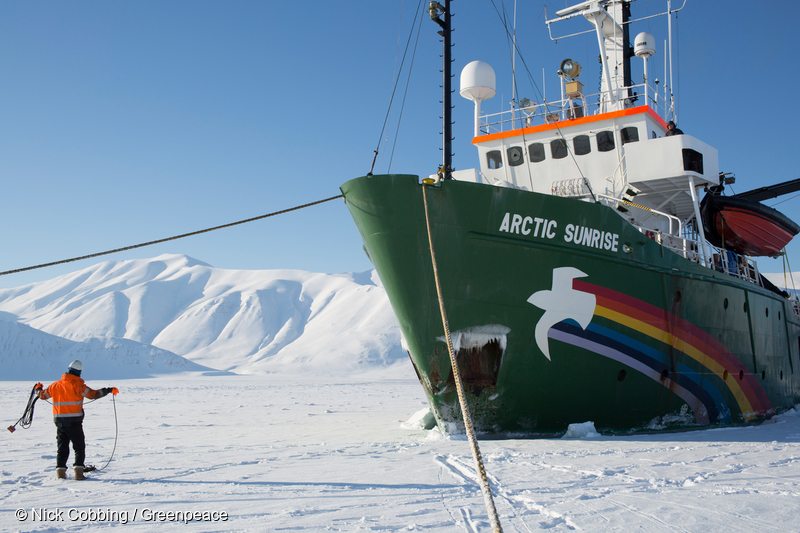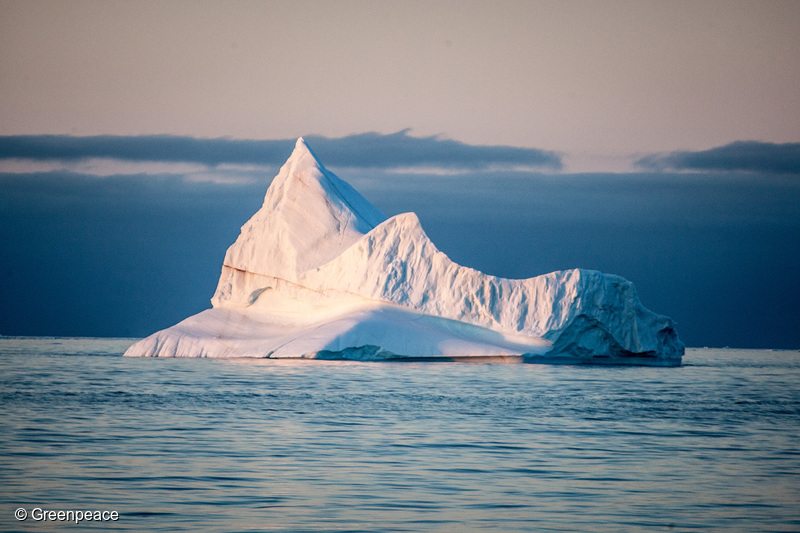As people and governments around the world are starting to act on climate change, the Norwegian government is moving in the opposite direction – opening up the remote Arctic for new oil drilling and putting people’s lives at risk.

The winter of 2015/ 2016 represents a record low for the yearly maximum extent of sea ice across the whole Arctic region. In Svalbard, the fjords would usually be partially covered with sea ice, but this winter most of the archipelago is surrounded by open water. The crew of the Arctic Sunrise ship, which traveled to the region during this important time, found very few patches of fast ice around the coastline. Local guides who lived on Svalbard and who joined the expedition, were surprised to see so little sea ice cover compared with previous years. Ringed seals require good sea ice to raise their young at this time of year and polar bears newly emerged from their dens, rely on healthy sea ice cover on which to hunt the seals.
That is why, in an unprecedented move, we are taking Arctic Oil to court. Winning the case will have impacts around the world and here are four reasons why we believe this case can make history.
Setting international precedent
We’re challenging the Norwegian Government’s decision to open up a new oil frontier, based on the Government having violated the terms of the Paris Agreement and the Norwegian Constitution’s Article 112. In short, this Article determines that it is the duty of the state to grant every person, and future generations, the right to a healthy environment.
What happens in the Courtroom of Oslo has the potential to have a monumental impact around the world. Some 90 countries have a Constitutionally protected right to a healthy environment. Courts in other countries are of course not bound by what gets decided in a Norwegian courtroom under Norwegian law.
However, the rights mentioned above are universal. Further, international legal principles and instruments used to give life to national law are also being used in legal cases around the world. We can expect that future legal proceedings around the world will look at the People vs. Arctic Oil case.
An iceberg in Baffin Bay. Greenpeace is on route to Clyde River, Nunavut, where it will deliver solar panels for the community.
Inspiring and encouraging others to hold politicians accountable
The People vs. Arctic Oil case highlights the power people have in creating change. Movements are built of individual acts of courage. A win in the Oslo district court could inspire and encourage others to stand up and hold politicians accountable of their climate promises and choose people over oil.
Sending a message to fossil fuel industry – the end of oil is near
With the triumph of renewables it is clear that the age of fossil fuels is ending. We’ve already seen the decline of coal, and oil is next in line. We already have the solutions, now it’s only a matter of ambition.
Ambition that the fossil fuel industry tries to kill. They seek for new oil in extreme locations such as the Arctic. This increases the cost of drilling and the risk of accidents. A win would send shock waves around the world – showing that since the Paris Agreement the landscape for the fossil fuel industry has really changed.
Millions of barrels of oil would stay in the bottom of the ocean
If we win, millions of barrels of oil would stay in the ground instead of being burned in the atmosphere. This would be extremely good news for humanity’s battle against climate change, as there is more oil in the existing fields than we can afford to burn.
Help us set the precedent, join People v. Arctic Oil
Join the movement on Facebook, Twitter and Instagram @GreenpeaceAP





